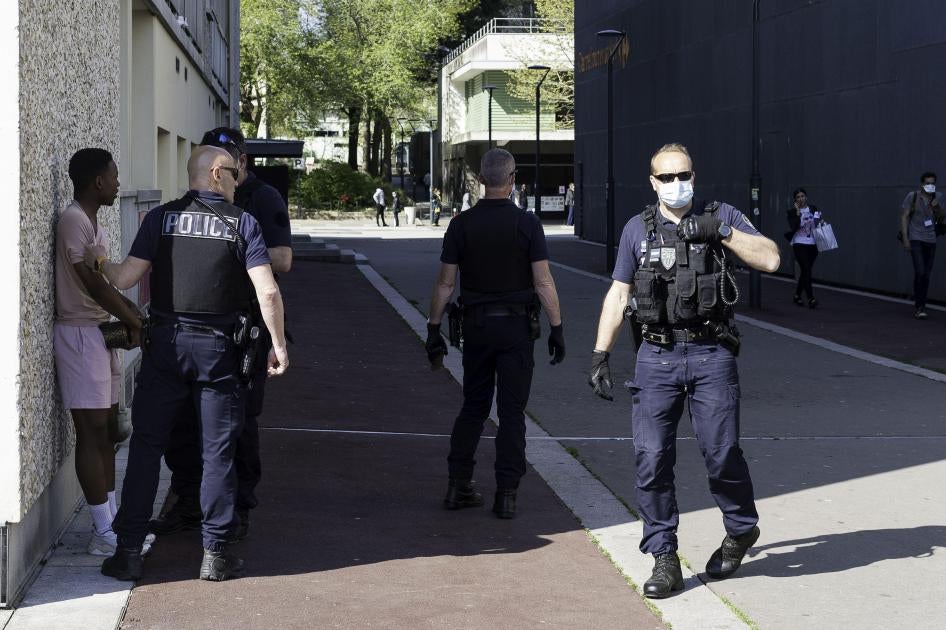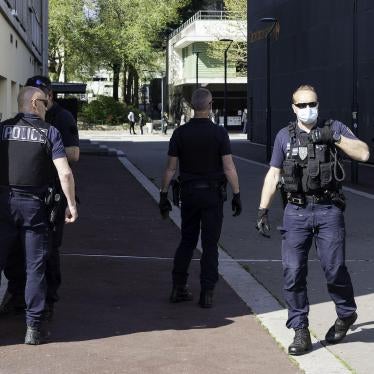By Bénédicte Jeannerod, France Director at Human Rights Watch, James A. Goldston, Executive Director of Open Society Justice Initiative (OSJI), Jean-Claude Samouiller, Chair of Amnesty International France, Céline Amar, Co-Chair of Réseau, égalité, antidiscrimination, justice, interdisciplinaire (Reaji), Issa Coulibaly, Founder and Chair of Pazapas-Belleville and Omer Mas Capitolin, Chair of Maison communautaire pour un développement solidaire (MCDS).
More than a month after the Council of State’s ruling recognizing France’s s failure to address the widespread practice of racial profiling, the French government has given no indication that it intends finally to take the problem seriously and adopt measures to end it.
As a result of the longstanding inertia of successive governments, and after years of calling on the government to act, in 2021 our six organizations initiated the very first class action lawsuit on racial discrimination in France. A law passed in 2016 paved the way for this type of collective legal action to challenge government inaction affecting a group of people, and to obtain that State authorities be ordered to take appropriate measures to put an end to discrimination.
As evidenced by an extensive body of research, reports from independent institutions, including the French Defender of Rights, and testimony from numerous victims as well as police officers, racial profiling particularly targets Black and Arab young men and boys or those perceived as such, including children as young as 10. These abusive and illegal identity checks, which are widespread throughout the country and deeply rooted in police practices, constitute systemic racial discrimination.
They undermine relations between the police and those affected and are deeply humiliating and degrading for the people subjected to them on a daily basis. They are often the starting point for additional police violence, and even cost the lives of those being checked -- intolerable deaths that grieve families and spark urban uprisings. As our lawyer, Antoine Lyon-Caen, asserted before the Council of State, "racial profiling is a scourge for society as a whole."
In its October 11 decision, the Council of State recognized the government’s failure to comply with its anti-discrimination obligations, and "the existence of a practice of identity checks based on the physical characteristics of the people being checked, associated with their real or supposed origin," stating that this practice is not limited to "isolated individual cases."
The Council of State considered that these acts "cause harm to those exposed to them" and constitute a "blatant disregard of the prohibition on discriminatory practices." The Council of State also highlighted "the lack of an administrative record of identity checks carried out across the territory, which our organizations and others have persistently denounced, calling for the authorities to record and evaluate data on identity checks and provide those stopped with a record of the stop.
This is the first time that France's highest administrative court has recognized the existence of such discriminatory police practices and their collective nature. This ruling contradicts the government's position, which -- while it doesn't deny that discriminatory identity checks may occur, insists they are isolated incidents carried out by officers behaving inappropriately.
In this regard, the Council of State’s decision marks a new stage in recognizing the scale of the problem, six years after France’s Court of Cassation ruled that discriminatory identity checks constitute "a gross fault engaging the responsibility of the State."
However, the Council of State’s decision is also disappointing, as the judges stopped halfway: although they recognized the existence of the illegal practice of racial profiling they did not order the state to take measures to end it, even though the 2016 law specifically provided them with this option. The judges considered that it was not within their remit to determine the measures to be taken - set out in detail in our petition - to put an end to the discriminatory practices, as these involve public policy decisions within the sole remit of the executive and legislative powers. This abdication by the State Council is particularly shocking for those who suffer this injustice on a daily basis, given the seriousness and scale of the problem. France can no longer ignore its obligations under national and international law.
In a report published on 6 December at the request of the Defender of Rights, the French Court of Audit highlighted the "massive" nature of identity checks in France and the fact that "the security forces have not given themselves the means to exhaustively record the checks carried out, to understand the reasons for them and to analyze the results". The Defender of Rights found the situation "more incomprehensible than ever" and called on the government to put in place "a public policy commensurate with the challenges of respecting rights and freedoms and improving relations between the police and the public”.
A separate case brought by six victims of racial profiling by French police before the European Court of Human Rights in 2017, has raised expectations for change. A ruling in this case is expected soon. The Council of State’s recognition of the practice of discriminatory checks will hopefully be a crucial element in the Strasbourg judges' assessment.
Following the Council of State’s decision, it is now the government's responsibility urgently to take all necessary measures to put an end to discriminatory identity checks. France can no longer continue to discriminate against countless people targeted by illegal police practices, while claiming to uphold "republican principles" as a cornerstone of its policy.
The government needs to act now. Its credibility and indeed social justice in France are at stake.








